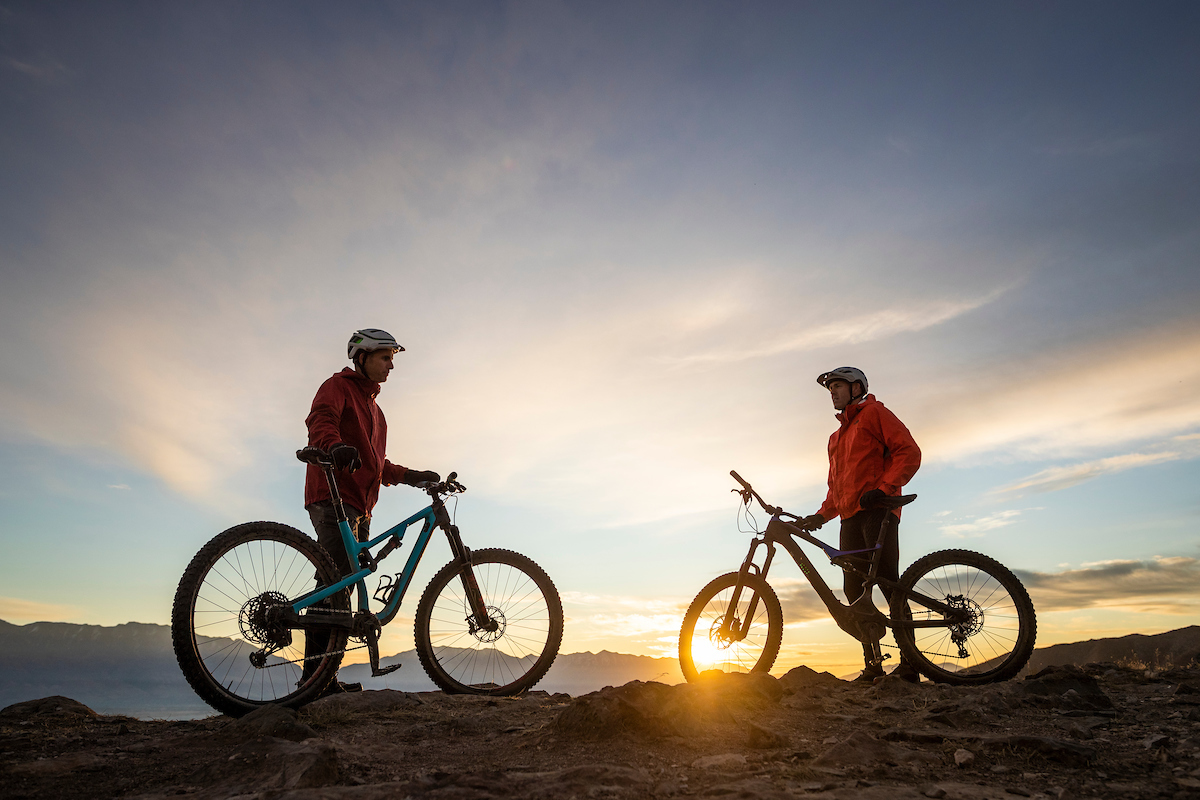


Looking for a fun and refreshing way to stay fit? Look no further than mountain biking! If you’ve ever wondered “Is mountain biking a good workout? “The answer is a big yes! Put on your helmet, hit the road, and let the pedals take you on an adventure that will not only test your limits but provide a great full-body workout.
Read More: How many calories do you burn while mountain biking
Mountain biking is more than just recreation; This is a powerful cardiovascular exercise that makes your heart beat faster and your lungs work harder. When you navigate rough terrain and steep inclines, your leg muscles tighten, increasing your strength and endurance.
But it’s not just your feet that benefit; Your core and upper body are also engaged as you balance and maneuver your way through obstacles.
Best part? Mountain biking isn’t like a monotonous gym workout; It is an exhilarating experience in nature that gives you a mental and emotional boost. So, if you are ready to embark on an exciting journey that will improve your fitness while exploring nature, let’s dive into the world of mountain biking as a great sport!
Read More: ” Difference Between Mountain Bike And Gravel Bike “
The Thrill of the Trail: Mountain Biking as an Adventure Workout
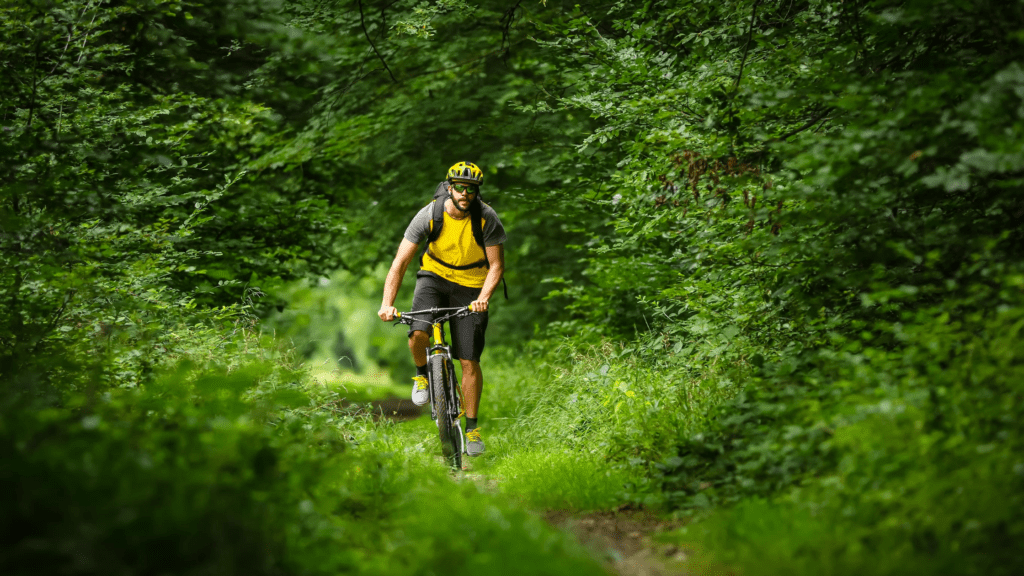


Tired of the same gym routine and looking for a workout that will take you on an exciting journey? Look no further than mountain biking! Put on your helmet, get on your bike, and get ready to experience the adrenaline-filled adventure of mountain biking.
Read More: ” Difference Between Mountain Bike And Gravel Time “
- The Call of Nature:
Mountain biking is not just a sport; It is an opportunity to immerse yourself in nature. Explore scenic trails, dense forests, and majestic mountains, make your heart beat faster, and flex your muscles.
- Cardiovascular Challenge:
Climbing steep inclines and descending spectacular descents make your heart beat faster and your lungs work. Mountain biking provides a great cardiovascular workout and improves endurance and overall fitness.
- Leg Day, Every Day:
Your feet are ready for care! Mountain biking works major lower body muscle groups such as the quadriceps, hamstrings, and calves. Continuous pedaling strengthens and tones your legs, giving you the strength to tackle any trail.
- Balance and Core Strength:
Standing on uneven ground requires excellent balance and core strength. Mountain biking builds these skills by giving you a strong foundation and core muscle tone.
- Upper Body Activation:
Don’t think your upper body is going for free! Steering, grip, and navigating engage your arms, shoulders, and back for an effective full-body workout.
- Mental Escape:
Mountain biking not only challenges your body but also stimulates your mind. By focusing on the journey ahead of you, you will experience a sense of awareness and freedom from the pressures of everyday life.
- Community and Friendship:
Mountain biking is not just a solitary activity; a way to connect with like-minded people. Joining cycling clubs and cycling groups will add a social element to your workouts.
So if you’re looking for an adventure sport that combines fitness and fun, mountain biking is the way to go. Grab your bike, ride the nearest trail, and experience the thrill of the trails in this great workout adventure!
Read More: Is mountain biking hard
Cardiovascular Challenge: How Mountain Biking Boosts Your Heart Health
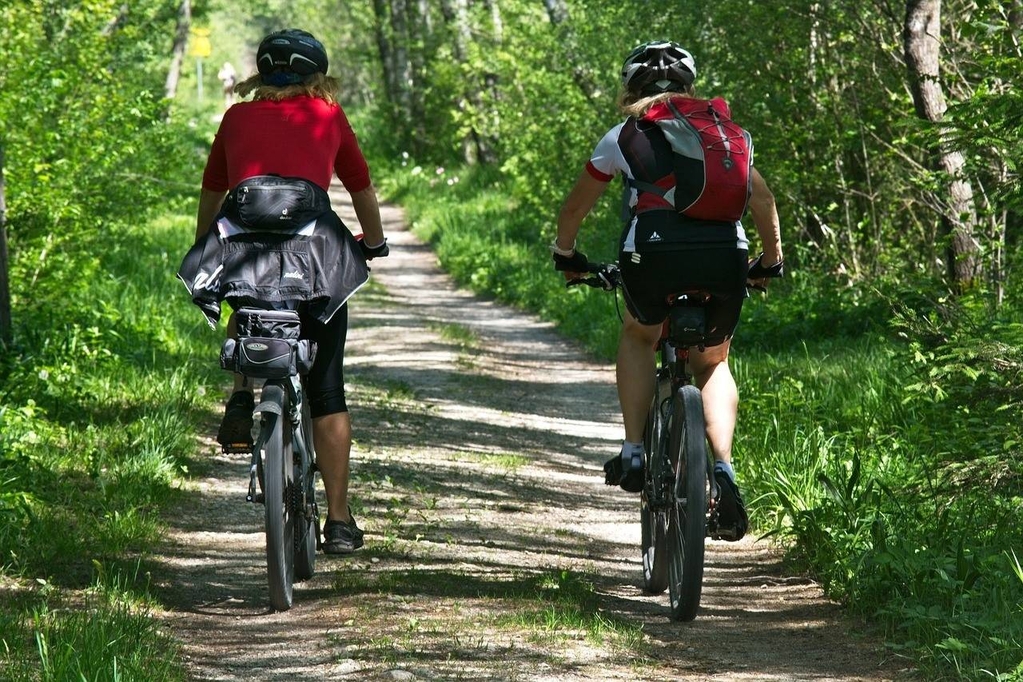


If you’re tired of traditional cardio, it’s time to improve your heart health! Mountain biking offers an interesting and effective way to uniquely train your cardiovascular system. Put on your helmet, jump on your bike, and let’s find out how mountain biking can improve heart health and improve your fitness.
Read More : ” Do Mountain Bike Tires Have Tubes? “
- Engaging the Cardio Machine:
When you hit the road on a mountain bike, you’re effectively turning your bike into a cardio machine. Constant pedaling, especially on inclines, makes your heart beat faster and raises your heart rate, thereby increasing cardiovascular endurance.
- Burning Calories and Melting Fat:
Mountain biking is a calorie-burning activity that helps you lose weight and get rid of stubborn fat. The combination of aerobic and resistance training on uneven ground results in high energy expenditure, promoting weight loss and overall fitness.
- Lowering Blood Pressure:
Regular mountain biking can have a positive effect on your blood pressure. As a cardiovascular exercise, it strengthens the heart muscle, promotes more efficient circulation, and lowers blood pressure.
- Boosting Endorphins:
The adrenaline rush and sense of accomplishment you get from mountain biking release endorphins, the “feel good” hormone. This natural mood enhancer can help reduce stress and improve mental health.
- Interval Training Opportunities:
Mountain biking naturally includes interval training alternating between bursts of intense effort on the climb and recovery periods on the climb. This type of exercise is good for heart health because it increases both aerobic and anaerobic capacity.
- Enhancing Lung Capacity:
Mountain biking requires deep, controlled breathing, which can increase lung capacity over time. Better lung function means your body can efficiently oxygenate your blood, supporting your overall heart health.
- Reducing the Risk of Heart Disease:
Regular mountain biking can significantly reduce your risk of heart disease and related conditions. The cardiovascular benefits of this outdoor activity promote a healthy heart and a stronger cardiovascular system.
So if you’re looking for a fun and exciting way to improve heart health, grab a mountain bike and go. With every pedal stroke, you train your heart by immersing yourself in the beauty of nature. Get ready to experience cardiovascular disease in the exciting world of mountain biking!
Read More: Are mountain bikes harder to pedal
Pedal Power: Building Leg Strength and Endurance on the Trails
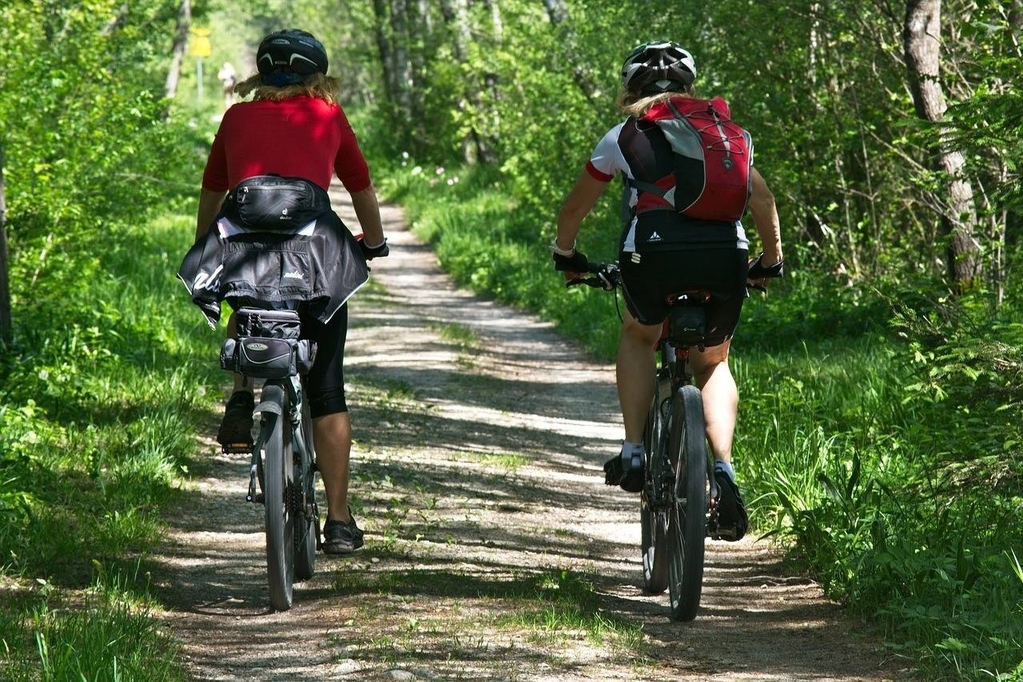


When it comes to mountain biking, your feet are the driving force that propels you through challenging terrain and exciting trails. While pedaling up and downhill, you not only have fun but also develop great leg strength and endurance.
Let’s dive into the world of pedal power and learn how mountain biking can turn your feet into a force to be reckoned with.
- Muscles in motion:
Mountain biking works for many muscle groups in the legs. During the downstroke, the quadriceps femoris is activated, and during the upstroke, the hamstrings in the back are worked hard. The calf muscles also play an important role in balancing the foot on the pedals.
- Improving Leg Strength:
Your leg muscles are tested as you climb the slopes and technical sections of the track. The stamina provided by rough terrain and steep slopes helps build leg strength and power, contributing to overall lower body strength.
- Endurance training:
Long mountain bike rides force your leg muscles to hold out for long periods. Track endurance training improves your legs’ power-holding ability and allows you to pedal over long distances and rough terrain.
- Improved Balance and Stability:
Maintaining balance and stability on unpredictable trails requires strong leg muscles. Mountain biking helps you develop balance and stability, which is important for navigating rough terrain and maintaining control.
- Cardiovascular exercises:
Cycling on the track isn’t just about leg strength, it’s also a great cardiovascular workout. Continuous pedaling makes your heart beat faster, increases blood flow to your leg muscles, and increases your cardiovascular endurance.
- Low-Impact Exercise:
Unlike high-impact activities like running, mountain biking is gentler on the joints and provides a great workout for the legs. This reduces the risk of injury and allows you to strengthen your legs without putting too much strain on your knees and ankles.
- Adapt to different terrains:
Mountain biking often involves traveling through a variety of terrains, from rocky surfaces to soft dirt roads. This stretch increases overall leg strength and adaptability by straining the leg muscles in various ways.
- Mental Strength and Determination:
By tackling challenging trails and overcoming fatigue, you also develop mental toughness and determination. Your legs keep moving forward and in turn, you gain the mental toughness to overcome obstacles both on and off the bike.
Next time you hit the road, remember that each pedal stroke adds incredible leg strength and endurance. Whether you’re a seasoned mountain biker or new to the sport, the power of pedaling will transform your legs and take your cycling adventure to the next level.
Embrace the excitement and challenge of building your leg strength and endurance on the trails and let the mountain biking world help you reach new heights of fitness!
Engaging Your Core: Balancing and Stability in Mountain Biking



Mountain biking is not only about exciting descents and exciting climbs, it is also a full-body exercise that requires strength, balance, and stability. When moving through difficult terrain and unpredictable trails, your core muscles play an important role in keeping you centered and in control.
Let’s dive into the core world of interaction and find out how it enhances your mountain biking experience.
- The Core Connection:
The main muscles include the rectus abdominis, obliques, transverse abdominis, and lower back muscles. These muscles work together to stabilize the spine and pelvis, providing a solid foundation for upper and lower body movements.
- Balancing Act:
Mountain biking requires perfect balance, especially when navigating difficult terrain and rough terrain. By working with your core muscles, you will be able to maintain your center position on the bike, stand up straight, and prevent falls.
- Steering and Control:
To steer and steer a bicycle, a strong core is needed. As you twist and turn on lanes, your core muscles contribute to fluid and precise movements, allowing you to navigate tight spaces with ease.
- Power Transfer:
The stable core is the bridge that connects the upper body to the lower body, ensuring efficient power transfer when pedaling. This powertrain increases pedal travel, making every turn more efficient and powerful.
- Climbing and Descending:
Whether you’re climbing steep slopes or descending technical trails, an engaged core is critical to maintaining balance and control. This optimizes the ascent and descent technique, allowing you to change your body weight and adapt your body position to the terrain.
- Uphill Efficiency:
Climbing hills can be physically demanding, but a strong core will help you maintain an efficient and stable climbing position. Engaging your core stabilizes your body, allowing you to conserve energy and focus on conquering those hills.
- Downhill Confidence:
The descent can be exciting, but it can also be difficult. The balanced core instills confidence during descents and helps you stay calm and in control even on bumpy roads.
- Injury Prevention:
A strong core not only improves your performance but also reduces the risk of injury. By supporting the spine and maintaining good posture, the abdominal muscles help protect the back and prevent strain during long journeys.
- Off-Bike Benefits:
The strong core benefits go beyond mountain biking. Core strength improves your overall posture, balance, and stability in daily activities, making you feel more confident in all aspects of life.
So the next time you hit the road, remember how important the hub is to your mountain biking adventure. Core muscle training will not only improve your performance but also add an element of fun and challenge to your event.
Realize the importance of grassroots participation and see how it turns your mountain biking experience into a true balancing act!
Upper Body Benefits: Arms and Shoulders at Work on the Bike



When we think of mountain biking, we often focus on the legs and abs as the primary strength for tackling the trails. However, the upper body, particularly the arms, and shoulders, plays an important role in guiding technical areas, maintaining control, and improving overall performance.
Let’s see how your arms and shoulders play a role during your mountain biking adventure and how they can benefit your cycling experience.
- Steering Precision :
Your arms and shoulders work in harmony for precise control. As you maneuver into a turn, your upper body muscles adjust the direction of your bike, guiding you safely through the course.
- Shock Absorption:
Mountain biking can be uncomfortable, especially on rough terrain. Your hands act as natural shock absorbers, softening the impact and minimizing the stress on your body for a more comfortable ride.
- Uphill power:
Climbing steep slopes requires additional upper body strength. Your arms and shoulders help bring you closer to the handlebars, distributing the force between your upper and lower body for a more efficient climb.
- Downhill Stability:
On the descent, your arms and shoulders play an important role in maintaining stability and balance. They help you control your bike, adjust your body position, and adapt to changing terrain.
- Pumping technique:
Your arms and shoulders are essential for push-up technique when moving on rough terrain or push-up lines. This includes pushing and pulling the handlebars to build momentum and maintain speed without pedaling.
- Technical maneuvers:
Performing technical maneuvers like the bunny hop, cartwheels, and dips requires upper body strength and coordination. Your arms and shoulders provide the strength and control needed to perform this move.
- Reduces Stamina and Fatigue:
A strong upper body reduces fatigue on long journeys. Because your arms and shoulders share the workload with your legs and core, they prevent premature muscle fatigue and allow you to ride longer and more comfortably.
- Off-bike advantages:
The benefits of a strong upper body are not limited to mountain biking. Improving arm and shoulder strength improves your daily activities and athletic performance, making you more capable and resilient in many areas of life.
- Injury Prevention:
A well-developed upper body helps prevent injuries and overuse. This maintains proper body alignment, reduces the risk of injury from repetitive movements, and improves overall cycling safety.
- Whole Body Workout:
Mountain biking provides a full-body workout that works your arms, shoulders, legs, and core muscles. The combination of upper and lower body efforts results in a complete and enjoyable fitness program.
Pay attention to your arms and shoulders the next time you hit the road, as these are important factors in your mountain biking success. Strengthening your upper body with targeted exercises and proper cycling technique will improve your performance, enhance your riding experience and unlock new levels of control and fun on the bike!
Mental Resilience: The Psychological Perks of Mountain Biking
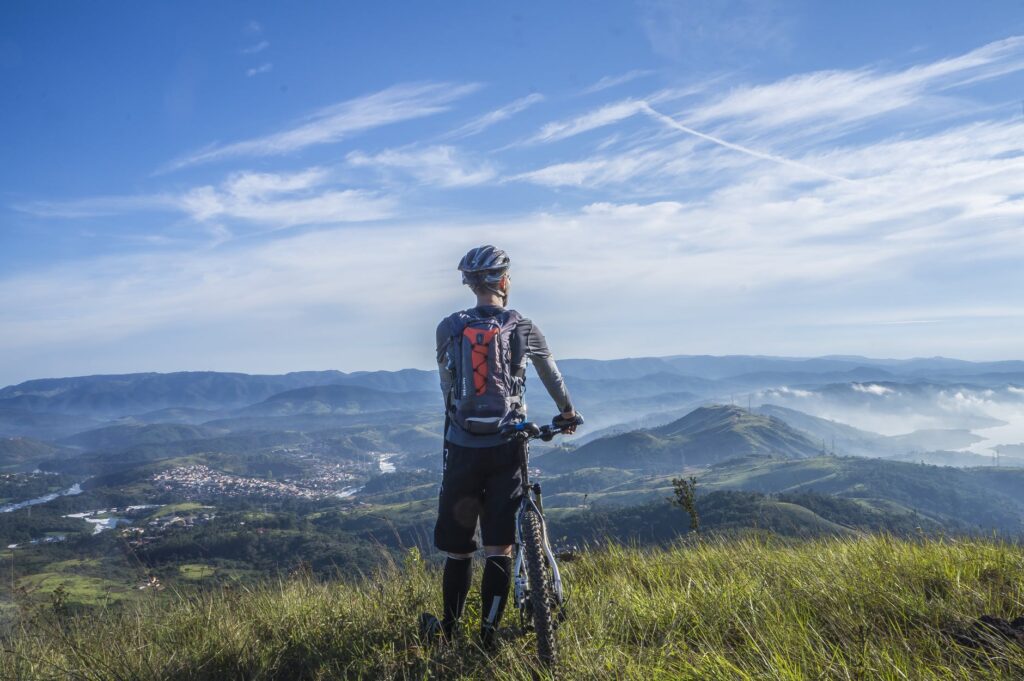


Mountain biking isn’t just a physical activity; It is a powerful mental journey that offers a variety of psychological benefits. As well as excitement and adrenaline, sport offers a unique opportunity to build resilience, improve mental health and find balance in a rapidly changing world.
Let’s take a look at the psychological benefits of mountain biking and how it can positively affect your mind.
- Stress Reliever:
When you’re on the track, the natural environment and sports work together to reduce stress and promote relaxation. The immersive experience provides a much-needed mental escape, allowing you to let go of everyday worries and focus on the present moment.
- Mindfulness and meditation:
Mountain biking is an active form of mindfulness and meditation. Focusing on the road, overcoming obstacles, and maintaining balance keeps your mind busy, increases mental clarity, and enhances concentration.
- Building trust:
Overcoming rough terrain and tackling challenging sections of the trail can build confidence and self-esteem. The sense of accomplishment that comes from overcoming obstacles develops a positive self-esteem and a positive attitude.
- Problem Solving Skills:
Mountain biking requires quick decision-making and problem-solving. When faced with unexpected obstacles, your brain actively processes information to find the best way forward, enhancing your problem-solving skills on the go.
- Patience and persistence:
Mastering mountain biking skills takes time and effort. This sport teaches patience and persistence as you work towards new goals and improve your technique both on and off the bike.
- Emotional release:
Emotions can run wild on a tiring journey. Mountain biking provides a safe outlet to release pent-up emotions and stress and promotes emotional well-being and mental cleansing.
- Mind-Body Connection:
Mountain biking develops a strong mind-body connection. You connect with your body’s feelings and emotions, understand its limits and learn to listen to the signals.
- Social Connection:
Mountain biking often involves riding with other people, developing social bonds, and a sense of community. Connecting with like-minded people can reduce feelings of isolation and increase overall happiness.
- Mental Endurance:
Overcoming difficult climbs and difficult trails tests psychological stability. Overcoming adversity on a bicycle leads to mental resilience that can be applied to many different aspects of life.
- Acknowledgments and appreciation:
Mountain biking in beautiful natural surroundings develops gratitude and appreciation for nature. Recognizing the beauty of nature and the pleasures of driving adds to a positive outlook on life.
- Stress Reduction and Mental Clarity:
Endorphins released during mountain biking lower stress hormones and increase mental clarity. This improved mental state can lead to better decision-making and the ability to solve problems in everyday life.
- Boost Creativity:
The meditative state achieved while mountain biking can boost creativity. It allows the mind to wander and make new connections, stimulates creativity, and inspires new ideas.
Enjoy the psychological benefits of mountain biking by immersing yourself in this challenging and invigorating sport. Whether you are an experienced cyclist or a novice, the mental endurance you develop on the trail will benefit every aspect of your life and make mountain biking an invaluable tool for achieving a healthy and balanced mind.
Exploring Nature: Connecting Fitness and the Great Outdoors
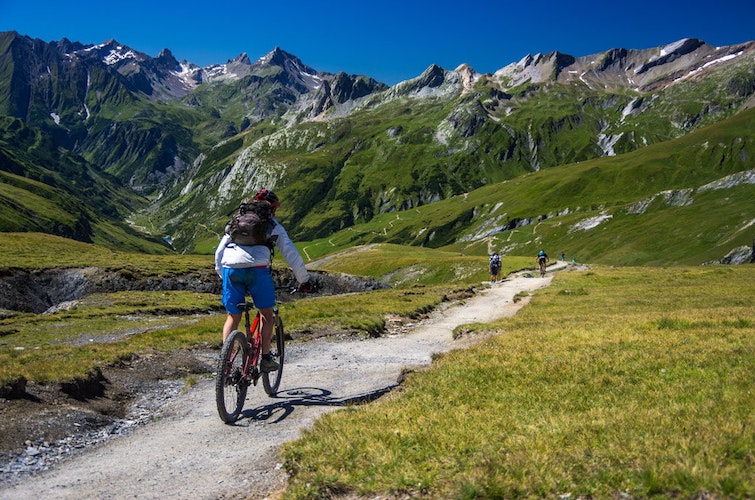


In today’s rapidly changing world, it can be difficult to find time to exercise and connect with nature. However, there is a powerful solution that combines the two: exploring nature through outdoor fitness.
Whether it’s hiking, running, or cycling, participating in outdoor activities not only improves physical health but also fosters a deeper connection with nature.
Let’s take a look at the benefits of learning about nature while staying fit and how it can change your life.
- Outdoor exercise:
Outdoor fitness classes allow you to get rid of the boredom of exercising indoors. Breathing in the fresh air, feeling the sun on your skin, and enjoying nature all add to the fun and excitement of your fitness routine.
- Natural Gyms:
Nature offers a varied and challenging terrain that is your natural fitness center. Whether you’re climbing a hill, running, or biking through the woods, the changing landscapes provide a full-body workout.
- Mental rejuvenation:
Connecting with nature helps reduce stress and anxiety, providing a mental reset from the demands of everyday life. The perfect way to clear your head and find peace in the beauty of nature.
- Communication with elements:
Outdoor fitness connects you to the elements such as earth, air, water, and fire (the sun). This basic connection deepens your understanding of nature and creates a sense of earthiness.
- Improve physical performance:
Outdoor training often engages different muscle groups and engages stabilizing muscles, which improves physical performance and overall fitness.
- Conscious movement:
Moving in harmony with nature promotes mindful movement in which you are fully present and strengthens the mind-body connection with every step or pedal stroke.
- Adventure and exploration:
Outdoor sports open up a world of adventure and discovery. Discovering new paths and hidden gems makes your fitness journey exciting and motivates you to keep pushing your limits.
- Community Links:
Outdoor fitness activities often attract like-minded people, cultivating a sense of community. Joining groups or outdoor fitness activities can create lasting friendships and exchanges of experience.
- Environmental awareness:
Outdoor sports give greater awareness of the environment. The more you explore nature, the more you understand the need to protect and preserve it.
- Vitamin D Booster:
Spending time outdoors exposes you to sunlight, which helps your body produce vitamin D, which is important for bone health and overall well-being.
- Seasonal changes:
Watching the seasons change while being active offers a unique perspective and understanding of natural cycles.
- Family Ties:
Outdoor sports can be a great family activity that promotes bonding and creates lasting memories with loved ones.
By exercising outdoors and exploring nature, you create a holistic approach to wellness that nourishes both body and mind. Whether you’re walking through majestic forests, jogging scenic trails, or biking cross-country, outdoor conversation enriches your wellness journey and brings immeasurable joy and fulfillment.
So get outside, get some fresh air, and embark on a journey full of adventure, fitness, and nature exploration.
Conclusion:
After looking at the many aspects of mountain biking as a sport, one thing is clear: mountain biking is not just a good sport; It was amazing! Physical activity, mental toughness, and connection with nature make mountain biking a truly unique and rewarding sporting experience.
With each pedal stroke, you activate your cardiovascular system, increase your endurance and support heart health. Challenging and varied landscapes work your leg muscles and core balance, working like a natural gym. The excitement of climbing trails and overcoming obstacles test your balance and coordination, making this a fun full-body workout.
In addition, mountain biking allows you to get away from the hustle and bustle of daily life. Whether you drive through dense forests, broad meadows, or rocky mountains, you will find solace and peace in the fresh air that uplifts your mind and soul.
The adventure and excitement of discovering new ways and overcoming obstacles feed your soul and make you want more. You become part of a passionate and friendly community of nature lovers and form lifelong relationships with like-minded people.
So, if you’re looking for a sport that combines physical challenge, mental toughness, and a deep connection with nature, then mountain biking is the answer. Whether you’re a beginner or an expert, mountain biking has something extraordinary to offer everyone.
Grab your helmet, hit the road, and be part of an exciting and transformative mountain bike training experience like no other!
Is mountain biking a good workout? Absolutely, and beyond— it’s an adventure that nourishes your body, mind, and soul!
FAQs:
Is mountain bike riding good for weight loss?
Yes, mountain bike riding can aid in weight loss. It provides a full-body workout, burns calories, and improves cardiovascular health, contributing to weight management goals.
Is mountain biking a good form of exercise?
Yes, mountain biking is an excellent form of exercise. It provides cardiovascular benefits, improves muscular strength and endurance, and enhances mental well-being through outdoor activities.
Is mountain biking a better workout than road biking?
The workout intensity may vary based on terrain and effort. Mountain biking offers more full-body engagement, while road biking emphasizes endurance and speed on smoother surfaces.
Does biking burn belly fat?
Yes, biking, including mountain biking, can help burn calories and reduce overall body fat, including belly fat, when combined with a balanced diet and regular exercise.
Will I lose weight if I bike everyday?
Regular biking, especially combined with a healthy diet, can contribute to weight loss by burning calories and increasing metabolism, making it an effective daily exercise for weight management.



Welcome to Bikegenics, where passion meets performance! We are a leading online destination for all things related to mountain biking, dedicated to providing you with top-notch gear, expert advice, and an immersive community to fuel your two-wheeled adventures. With a commitment to excellence and a deep love for the sport, we strive to elevate your biking experience to new heights.
